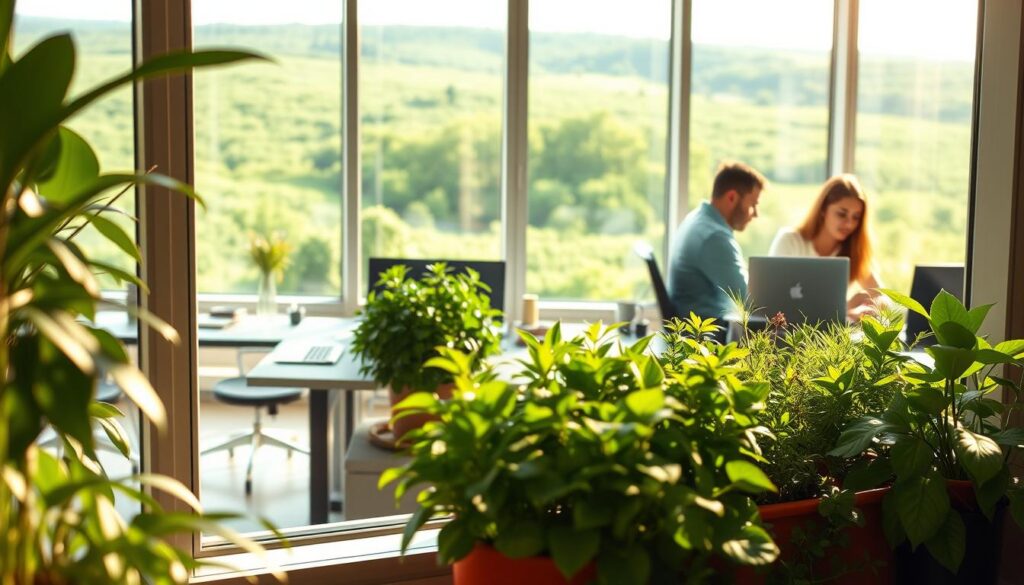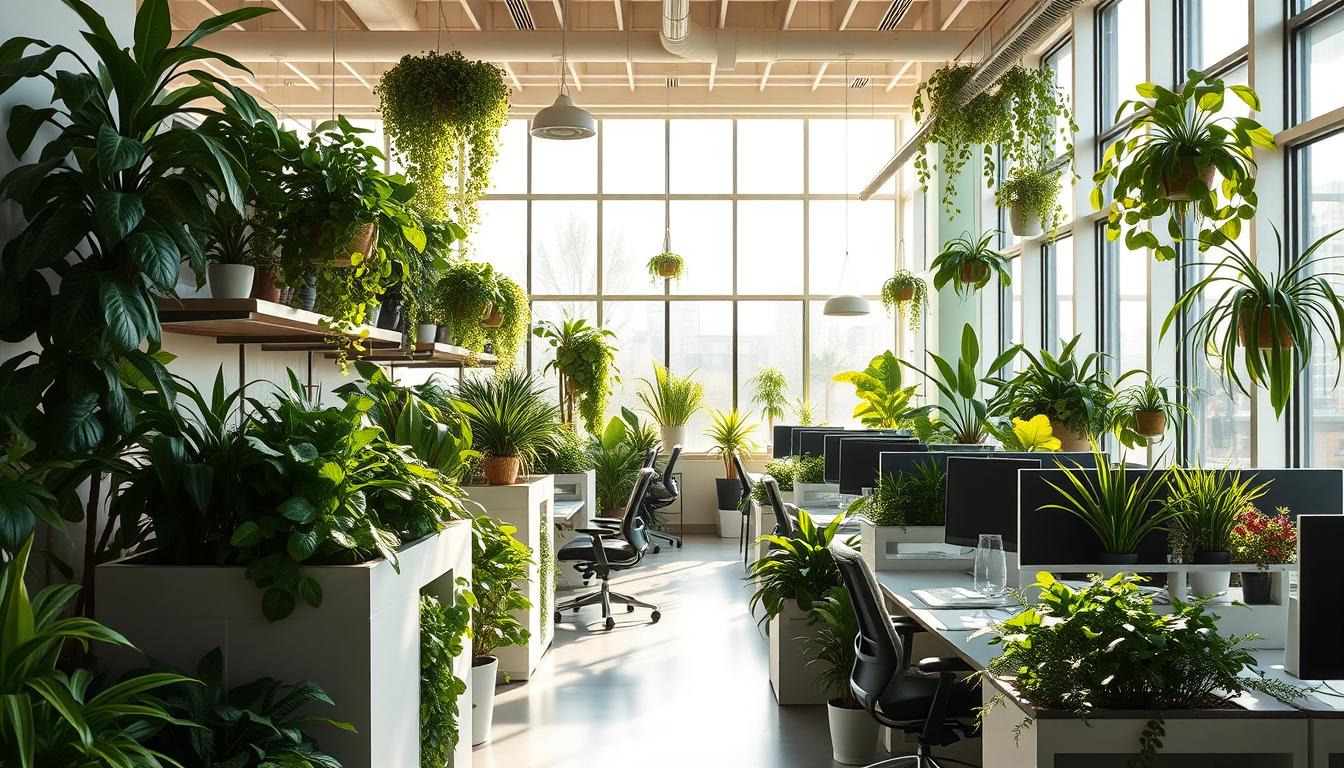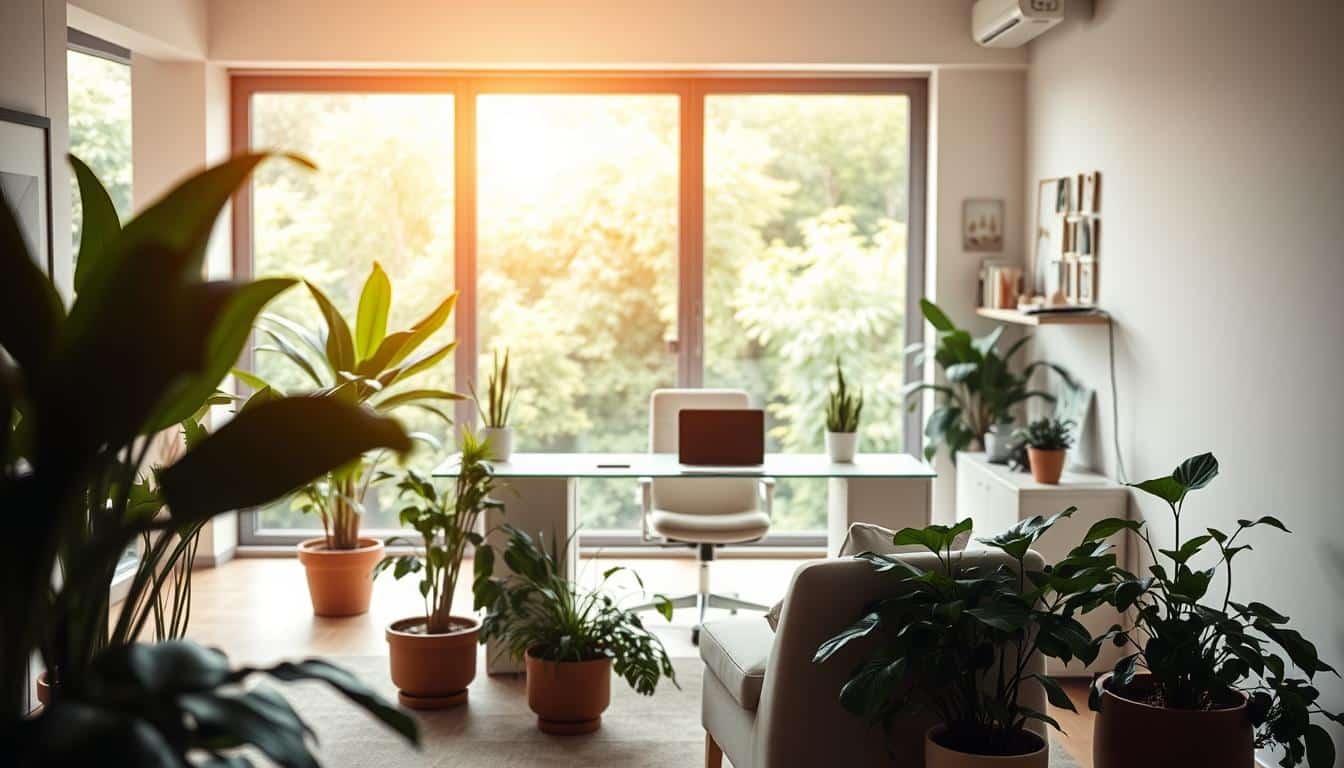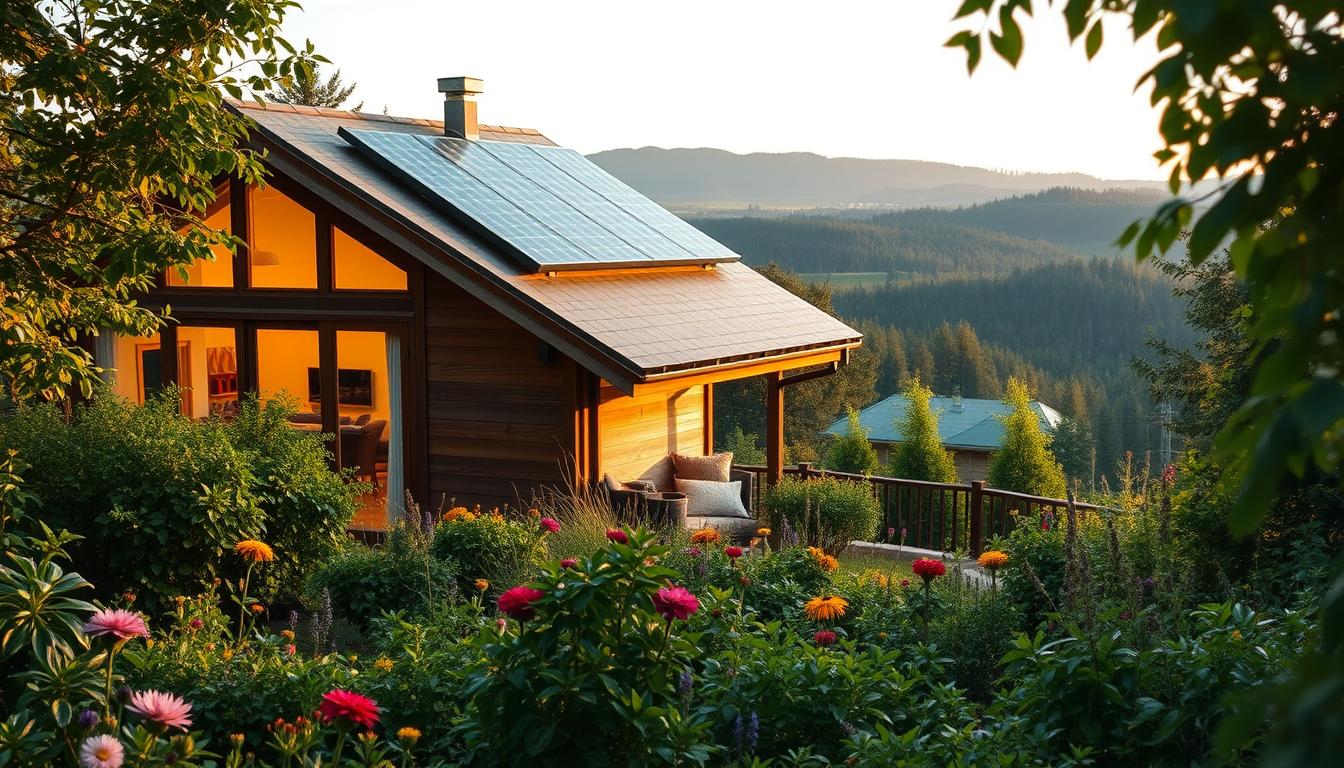In our fast world, improving how employees feel is key for good productivity and happiness at work. Adding nature into office areas is a smart move. It uses biophilic design ideas to make spaces that lift workers’ spirits and make the workplace more interesting.
This piece looks at how nature helps our minds. It makes a strong argument for why plants are important in designing work spaces.
The Importance of Green Exposure in the Workplace
Creating a workplace filled with nature has big benefits. It’s good for both the people who work there and their bosses. Green spaces help make the office a better place for everyone.
As companies aim for healthier work environments, knowing the value of nature is key. It plays a big role in making work life better.
Understanding the Psychological Benefits
Studies show that being around greenery helps people feel better mentally. It can lessen stress and make people feel more at peace. Plus, seeing plants can lower blood pressure and uplift spirits.
Since most people spend a lot of time indoors, bringing outdoor elements in is smart. It boosts well-being and helps people do better at their jobs.
How Green Spaces Improve Employee Well-being
Workplaces that include nature help employees thrive. Green areas increase happiness at work and clear the mind. They also fight off burnout by providing soothing spots to relax.
Companies that focus on adding green elements not only make their spaces healthier. They also build a positive work culture. This leads to better work results and happier employees.

Biophilic Design: A Key Approach
Biophilic design is key in today’s workspace design, connecting us to nature. Frederick Law Olmsted, a landscape architect, played a big role. He pushed for natural spaces in cities, influencing design and architecture.
Historical Context and Evolution of Biophilic Design
Biophilic design has grown for centuries, adapting to urban changes and well-being insights. It’s rooted in the psychological upsides of nature in design. This history shows our long-term value on nature for health and work productivity. As cities grew, blending nature in living and work areas became a must.
Modern Applications of Biophilic Concepts in Workspaces
Now, biophilic design shines in modern offices through several ways. Adding plants, increasing natural light, and water features make offices better. These enhancements boost creativity and team work, making workers happier. By including nature in offices, we make them look and feel better, leading to healthier and more efficient workspaces.
Benefits of Integrating Nature in Office Spaces
Adding nature to office spaces has many perks for our health and mood. It makes the air cleaner, boosting our energy and immune system. This green setting also helps us stay calm and more productive.
Enhancing Physical Health Through Green Environments
Offices with plants make people healthier. Studies show that plants keep the air moist, which is good for our breathing. Being around greenery means less sickness and a happier workplace.
Improving Mental Health and Reducing Stress
Green spaces in offices are great for our minds too. People working near plants feel less stressed. This peace of mind leads to loving our jobs more, being more creative, and feeling less anxious. Being surrounded by nature keeps us focused and ready to work.
Real-world Examples of Green Spaces
Adding green spaces to cities shows how nature improves work life. These areas make places look better and help workers feel good and come up with new ideas.
Case Study: Google’s Rooftop Park Initiative
Google’s rooftop park is a great way to make workspaces better. It’s big and gives a quiet spot in the busy city. Being around plants helps people relax and think better, which is great at work.
Canary Wharf’s “Green Spine” Development
Canary Wharf shows how green paths can change city planning. The “Green Spine” lets workers take breaks and enjoy nature. This project makes the area nicer and supports a healthy way of living for its employees.
Employee Mood Regulation Through Green Exposure
Recent studies show green exposure helps with employee mood regulation. It highlights how nature positively affects morale at work. Access to greenery increases happiness and lowers anxiety in staff.
The presence of plants and natural views makes for a more productive work environment. This is because they help calm people down.
Research Findings on Mood Enhancement
Studies reveal that green spaces and plants at work improve emotional well-being. When surrounded by nature, employees feel more relaxed and energized. This leads to more creativity and better team collaboration.
Long-term Benefits of Workplace Greenery
Workplace greenery’s benefits last longer than just a mood boost. Being around nature regularly makes people more satisfied with their jobs. It also helps keep employees longer.
Green spaces in the office make people feel connected. They contribute to a happier and more devoted team.
Designing Outdoor Spaces for Employee Engagement
Designing effective outdoor spaces is key to boosting employee engagement. These spaces offer a place to relax and interact. Making areas that welcome employees outside for breaks helps their well-being.
Creating Inviting Areas for Relaxation
To create relaxing spots at work, careful planning is needed. Essentials include:
- Comfortable seating options like benches and loungers
- Walking paths that encourage movement and exploration
- Greenery that softens the atmosphere and promotes tranquility
A good outdoor area encourages employees to relax and connect.
Landscaping Tips to Enhance Well-being
Good landscaping improves outdoor areas. Here are some tips:
- Selecting native plants that adapt well to the local climate
- Creating spaces that promote social interactions, such as communal gardens
- Incorporating shaded areas to provide comfortable respite from the sun
Thinking about these elements makes outdoor spaces better. It also gets employees to enjoy the outdoors, which boosts engagement and relaxation.
Sustainability in Workplace Landscaping
Modern workplaces are going green with sustainable landscaping. It’s good for the planet and makes work areas look better. Using eco-friendly items like organic fertilizers and xeriscaping saves resources and keeps outdoor areas healthy.
Choosing local plants cuts down on upkeep and water use. They also look great and help people feel connected to the area. When workers are around these green spaces, they feel happier and more driven. Going green shows a company cares about the environment and draws in people who value that.
Implementing and Maintaining Green Features
Keeping green features effective in the workplace is crucial. It needs a lot of attention to regular upkeep. These outdoor areas boost employee happiness a lot. Workers feel proud of their environment. This makes their work experience better. Well-kept green spaces also encourage relaxation and a good work-life balance.
Importance of Regular Maintenance for Employee Morale
Keeping outdoor areas nice and tidy is key for happy employees. It makes them want to spend time outside, which is good for relaxation and work. Seeing these areas well-kept makes employees feel involved. It shows that the company cares about their well-being and values.
Creating a Collaborative Environment through Outdoor Spaces
Outdoor spaces can help employees work better together. Adding places to sit, gardens, or small amphitheaters boosts teamwork. Getting employees to help design and care for these areas builds a team spirit. It makes communication better and everyone feels more part of the team. This makes the workplace better overall.
Conclusion
Adding green spaces to office design is key for better employee health. It brings nature inside, which boosts health, creativity, and teamwork. With more greenery, employees enjoy their work more and stay motivated.
Putting plants in offices is a smart move. It makes teams work better, helping the company succeed. By making offices greener, companies plan for a future where both people and the business win.
It’s important for businesses to add more green areas. This change improves how happy and satisfied employees feel. By doing this, companies make spaces look good and support their team’s health.



